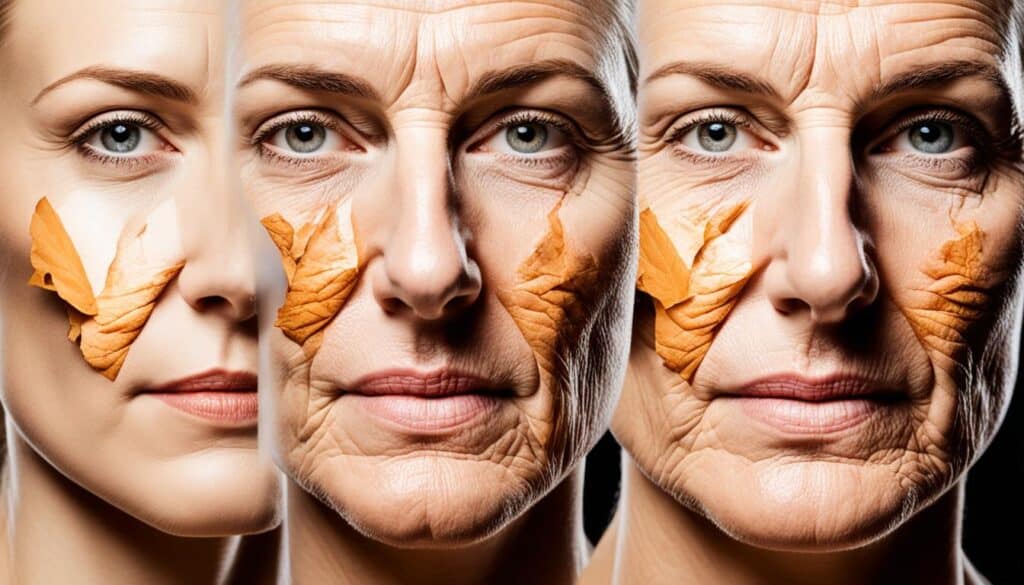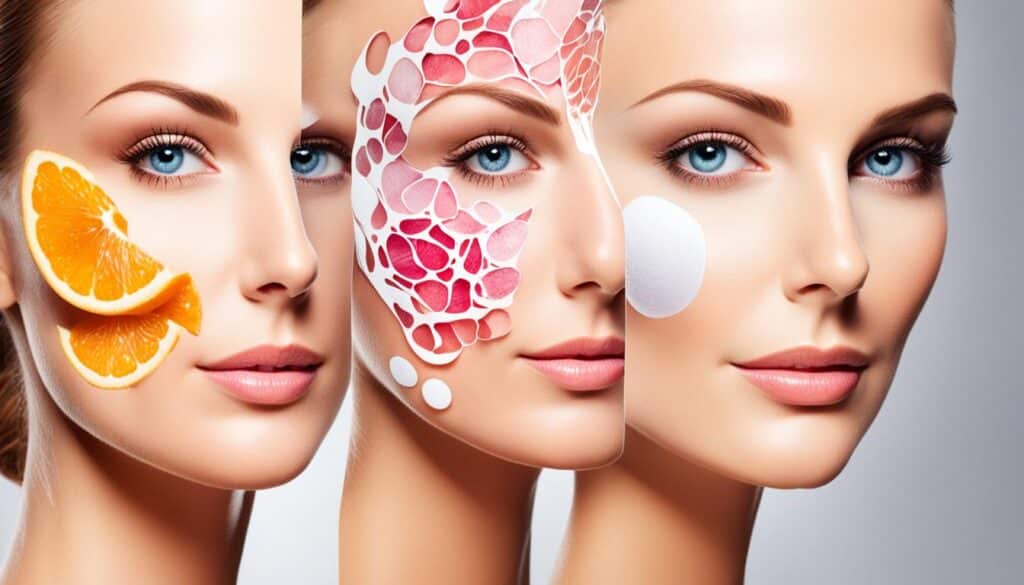Skin Healthcare : Good skin care and a healthy lifestyle are vital for achieving and maintaining radiant skin. By following a proper skincare routine and utilizing dermatologist-recommended products, you can improve the health and appearance of your skin. In this article, we will explore the essential steps to achieve a glowing complexion and offer expert advice on skincare practices.
Key Takeaways:
- Adopt a gentle skincare routine that includes cleansing, moisturizing, and protecting your skin from the sun.
- Avoid smoking as it contributes to premature aging and damages collagen and elastin fibers in the skin.
- Eat a balanced diet rich in fruits, vegetables, whole grains, and lean proteins to nourish your skin from within.
- Manage stress through adequate sleep, setting limits, and engaging in activities that promote relaxation.
- Incorporate essential skincare products like cleansers, exfoliants, moisturizers, sunscreens, serums, and eye creams into your routine.
Protect Yourself from the Sun
Sun protection is crucial for maintaining healthy skin and preventing various skin problems. Exposure to the sun’s harmful ultraviolet (UV) rays can lead to sunburn, premature skin aging, and an increased risk of skin cancer. By taking the necessary precautions, you can minimize the damaging effects of the sun on your skin.
Here are some key practices to protect yourself from the sun:
- Apply sunscreen: Use a broad-spectrum sunscreen with a Sun Protection Factor (SPF) of at least 15 or higher. Apply it generously to all exposed areas of skin, including your face, neck, arms, and legs. Reapply every two hours or after swimming or sweating.
- Seek shade: Limit your sun exposure during the peak hours of 10 a.m. to 4 p.m. when the UV rays are the strongest. If possible, stay in the shade, especially when the sun is directly overhead.
- Wear protective clothing: Cover up as much skin as possible with lightweight, loose-fitting clothing. Opt for long-sleeved shirts, long pants, and wide-brimmed hats to shield yourself from the sun’s rays.
- Use sunglasses: Protect your eyes from UV damage by wearing sunglasses that block both UVA and UVB rays. Look for sunglasses labeled with 100% UV protection or UV400.
Incorporating these sun protection measures into your daily routine will help safeguard your skin from harmful UV rays and reduce the risk of sun damage. Remember, sun protection is not just for sunny days – UV rays can penetrate clouds, so it’s important to prioritize sun protection even on overcast days.
“Sun protection is essential for maintaining healthy skin and preventing the harmful effects of UV radiation. By following recommended sun protection practices, you can significantly reduce your risk of developing skin cancer and premature skin aging.”
– Dr. Elizabeth Miller, Dermatologist
It’s important to note that sun protection is necessary year-round, not just during the summer months. Even on cloudy or cold days, UV rays can still penetrate your skin and cause damage. So, make sun protection a daily habit for healthier and younger-looking skin.
| SPF Level | UVB Protection | Estimated Sunburn Protection |
|---|---|---|
| 15 | 93% | About 150 minutes |
| 30 | 97% | About 300 minutes |
| 50 | 98% | About 500 minutes |
| SPF 100 | 99% | About 1000 minutes |
The Importance of Broad-Spectrum Sunscreen
When choosing a sunscreen, make sure it offers broad-spectrum protection. Broad-spectrum sunscreens protect against both UVA and UVB rays. UVB rays are primarily responsible for sunburn, while UVA rays penetrate deeper into the skin and contribute to premature aging and skin cancer. Using a broad-spectrum sunscreen ensures you’re protected against both types of harmful UV rays.
Quit Smoking for Better Skin
Smoking has detrimental effects on your skin, contributing to premature skin aging, wrinkles, and various skin issues. The habit of smoking compromises the health and appearance of your skin in several ways.
Firstly, smoking narrows the blood vessels, reducing blood flow and oxygen supply to the skin. This impaired blood flow deprives the skin of essential nutrients and oxygen, leading to dullness and a lackluster complexion.
Additionally, smoking damages crucial components of the skin, such as collagen and elastin fibers. Collagen provides structure and elasticity to the skin, while elastin allows it to bounce back. Smoking accelerates the breakdown of collagen and elastin, resulting in sagging skin, fine lines, and deep wrinkles.
To highlight the impact of smoking on collagen and elastin, a study conducted by researchers at Case Western Reserve University found a significant correlation between smoking and reduced collagen synthesis. Smokers showed a decrease of 40% in collagen synthesis compared to non-smokers.
“The damaging effects of smoking on the skin are profound. It not only accelerates skin aging but also hampers the skin’s ability to repair itself. Quitting smoking is the most effective and important action you can take to protect your skin and improve its overall health and appearance.”
The good news is that quitting smoking can help reverse some of the damage and improve the health of your skin. Once you quit smoking, your body starts the healing process, and over time, blood flow and oxygen levels to the skin increase, allowing it to rejuvenate.
It is essential to consult with a healthcare professional for guidance and support on quitting smoking. They can provide resources, recommend smoking cessation programs, and help you develop a plan to successfully quit smoking.
Benefits of Quitting Smoking for Your Skin:
- Reduced risk of premature skin aging and wrinkles
- Improved skin tone and texture
- Enhanced blood flow and oxygen supply to the skin
- Promotion of collagen and elastin production
- Decreased risk of skin conditions such as acne and psoriasis
Committing to a smoke-free lifestyle not only benefits your overall health but also greatly improves the health and appearance of your skin. It’s never too late to quit smoking and give your skin the chance to regain its natural radiance and vitality.

Sources:
- “Cigarette smoking and skin aging in subjects aged 60 and older” – The New England Journal of Medicine
- “Effects of Cigarette Smoking on Skin Elastic Fibers: A Histologic and Immunohistochemical Study” – JAMA Dermatology
- “Smoking-related alterations in the physiology of the skin” – International Journal of Cosmetic Science
Gentle Skin Care Routine
Adopting a gentle skin care routine is essential for maintaining the health and appearance of your skin. By following these practices and tips, you can ensure that your skin stays balanced, protected, and free from damage.
Cleansing
When cleansing your skin, it’s important to use mild cleansers that don’t strip away the skin’s natural oils. Avoid strong soaps or harsh cleansers that can disrupt the skin’s pH balance and cause dryness or irritation. Gently cleanse your face using a mild cleanser suitable for your skin type, and avoid scrubbing your skin vigorously.
Moisturizing
Moisturizing is a crucial step in any skincare routine. After cleansing, apply a moisturizer that is suitable for your skin type. Look for a moisturizer that is hydrating, non-comedogenic, and contains beneficial ingredients like hyaluronic acid or ceramides. Regular moisturization helps to maintain the skin’s moisture barrier and keeps it hydrated.
Avoiding Strong Soaps
Strong soaps can be harsh on the skin, stripping away its natural oils and causing dryness. It’s important to avoid using strong soaps on your face and body. Instead, opt for gentle cleansers or soap-free alternatives that are formulated to cleanse without compromising the skin’s natural balance.
Shaving Tips
Proper shaving techniques can help prevent irritation and razor burn. Before shaving, make sure your skin is properly hydrated. Shave in the direction of hair growth, using a clean and sharp razor. Rinse the razor after each stroke to prevent clogging. After shaving, apply a moisturizer or soothing balm to protect and nourish the skin.

By incorporating these gentle practices into your skin care routine, you can maintain a healthy and balanced complexion. Remember to be consistent with your skincare routine and adjust it based on your skin’s specific needs.
Maintain a Healthy Diet
A healthy diet is crucial for improving and maintaining skin health. By incorporating a variety of nutrient-rich foods into your daily meals, you can promote a glowing and youthful complexion. Here are some dietary guidelines to follow:
1. Fruits and Vegetables
Include plenty of fruits and vegetables in your diet as they are packed with vitamins, minerals, and antioxidants that nourish your skin. Opt for colorful options like berries, citrus fruits, leafy greens, and bell peppers.
2. Whole Grains
Choose whole grains over refined grains as they contain more fiber, which aids in digestion and promotes healthy skin. Include foods like quinoa, brown rice, oats, and whole wheat bread in your meals.
3. Lean Proteins
Include lean proteins such as poultry, fish, tofu, and legumes in your diet. These provide essential amino acids that are important for collagen production and skin repair.
4. Hydration
Stay hydrated by drinking an adequate amount of water throughout the day. Hydration is essential for maintaining skin elasticity and preventing dryness. Aim for at least 8 glasses of water per day.
5. Skin-Boosting Nutrients
Certain nutrients play a key role in skin health. Incorporate foods rich in vitamin A (carrots, sweet potatoes), vitamin C (citrus fruits, bell peppers), and vitamin E (almonds, sunflower seeds) to protect your skin from oxidative stress and promote collagen synthesis.
| Nutrient | Food Sources |
|---|---|
| Vitamin A | Carrots, sweet potatoes, spinach |
| Vitamin C | Oranges, strawberries, broccoli |
| Vitamin E | Almonds, sunflower seeds, avocados |
Remember, maintaining a healthy diet is just one aspect of a comprehensive skincare routine. Combine this with other essentials like sun protection, gentle skincare products, stress management, and regular exercise for optimal skin health.

Manage Stress for Healthy Skin
Stress can have a significant impact on your skin’s health. It has been linked to various skin problems, including acne breakouts and skin sensitivity. When you are under stress, your body releases stress hormones like cortisol, which can disrupt the balance of your skin and lead to inflammation.
To maintain healthy skin, it is essential to manage stress effectively. Here are some practices that can help:
- Get enough sleep: A good night’s sleep plays a crucial role in reducing stress levels. Aim for 7-9 hours of quality sleep each night to support skin rejuvenation and repair.
- Set limits: Learn to prioritize yourself and say no to excessive commitments. Setting boundaries will help you reduce stress and allow more time for self-care.
- Engage in enjoyable activities: Find activities that help you relax and de-stress. This could include practicing yoga, meditation, reading, listening to music, or spending time in nature.
By managing stress and incorporating these practices into your daily routine, you can promote healthier, more radiant skin.
“Stress is a powerful trigger for skin issues like acne breakouts and skin sensitivity. Taking steps to manage and reduce stress can have a positive impact on your skin’s health.” – Dr. Emily Johnson, Dermatologist

Stress and Acne Breakouts
Stress can disrupt the delicate balance of hormones in your body, leading to increased oil production that clogs the pores. This can result in acne breakouts, especially in individuals who are prone to acne. Additionally, stress can worsen existing acne by causing inflammation and delaying the healing process.
Stress and Skin Sensitivity
When you are under stress, your skin’s barrier function may become compromised, making it more susceptible to external irritants. This can lead to skin sensitivity, causing redness, itching, and discomfort. Managing stress can help maintain the skin’s natural protective barrier and reduce sensitivity.
| Effects of Stress on Skin | Manage Stress for Healthy Skin |
|---|---|
| Increased oil production | Get enough sleep |
| Inflammation and acne breakouts | Set limits |
| Compromised barrier function | Engage in enjoyable activities |
By prioritizing stress management and implementing healthy lifestyle habits, you can safeguard your skin’s health and achieve a radiant complexion.
Essential Skincare Products
Incorporating essential skincare products into your routine is crucial for maintaining healthy and radiant skin. By using a combination of carefully selected products, you can address specific concerns and enhance the overall health and appearance of your skin.
The Importance of a Gentle Cleanser
A gentle cleanser is the foundation of any skincare routine. It effectively removes dirt, oil, and impurities without stripping the skin of its natural moisture. Look for cleansers that are free from harsh chemicals and fragrances, and suitable for your skin type. Regularly cleansing your skin allows for better product absorption and helps keep pores clear.
Exfoliation for Smooth and Renewed Skin
Exfoliants are an essential part of any skincare routine as they help remove dead skin cells and promote cell turnover. This process reveals smoother, brighter skin and can improve the appearance of fine lines and wrinkles. Opt for gentle exfoliants that are suited to your skin type and use them 2-3 times a week to maintain a healthy complexion.
Provide Nourishment with a Moisturizer
A moisturizer is vital for skin hydration and retaining moisture. It helps to balance skin’s oil production and protects it from external aggressors. Choose a moisturizer that matches your skin type and addresses your concerns, whether it’s dryness, oiliness, or sensitivity. Regular moisturizing keeps your skin supple and healthy.
Shield Your Skin with Sunscreen
Sunscreen is a non-negotiable skincare step that protects your skin from harmful UV rays. Apply a broad-spectrum sunscreen with at least SPF 30 every day, even when it’s cloudy. This reduces the risk of sunburn, premature aging, and the development of skin cancer. Look for sunscreens that are oil-free and suitable for your skin type.
The Power of Serums for Targeted Treatment
Serums are potent formulations that deliver concentrated ingredients to address specific skin concerns. They often contain active ingredients like vitamins, antioxidants, and peptides that nourish and repair the skin. Choose serums that target your particular needs, whether it’s brightening, firming, or reducing hyperpigmentation. Incorporate them into your routine after cleansing and before moisturizing.
Revitalize with Eye Cream
The delicate skin around the eyes requires special care. Eye creams provide hydration and target concerns like dark circles, puffiness, and fine lines. Choose an eye cream that suits your specific needs and look for ingredients like hyaluronic acid and peptides. Gently apply the eye cream using your ring finger to avoid applying excessive pressure to the delicate skin.
By incorporating these essential skincare products into your daily routine, you can achieve and maintain healthy and radiant skin. Remember, consistency is key, and understanding your skin type and concerns will guide you in selecting the most suitable products for optimal results.

The Role of Gut Health in Skin Care
The health of your gut plays a crucial role in the overall health of your skin. The gut and skin are connected through various biological pathways, and an imbalance in gut health can manifest in a range of skin conditions, including acne, psoriasis, and eczema. By prioritizing gut health and incorporating specific dietary choices, you can nurture a healthy gut and promote optimal skin health.
One key aspect of gut health is the presence of beneficial bacteria known as probiotics. Probiotics help maintain the delicate balance of bacteria in the gut, supporting proper digestion and immune function. Consuming probiotic-rich foods such as yogurt, kefir, sauerkraut, and kimchi can help replenish these beneficial bacteria and contribute to a healthy gut flora.
In addition, incorporating fiber-rich foods in your diet can have a positive impact on both your gut and skin health. Fiber acts as a prebiotic, serving as food for the beneficial bacteria in your gut. By consuming foods like fruits, vegetables, whole grains, and legumes, you can promote the growth of these beneficial bacteria, supporting gut health and indirectly benefiting your skin.
Benefits of Maintaining Gut Health for Skin Conditions:
- Reduces inflammation: A healthy gut helps regulate the body’s inflammatory response, which can help alleviate inflammation-related skin conditions like acne and rosacea.
- Promotes nutrient absorption: A well-functioning gut enhances nutrient absorption, ensuring that essential vitamins, minerals, and antioxidants reach the skin, nourishing and protecting it from within.
- Supports collagen synthesis: Collagen is crucial for maintaining skin elasticity and preventing premature aging. A healthy gut facilitates the synthesis of collagen, promoting skin resilience and reducing the appearance of fine lines and wrinkles.
- Enhances toxin elimination: A properly functioning gut helps eliminate toxins and waste products efficiently. This detoxification process can help prevent skin conditions and maintain a clear complexion.
The Gut-Skin Connection: An Imbalance in Gut Microbiome and Skin Conditions:
An imbalanced gut microbiome, characterized by a lack of diversity and an overgrowth of harmful microbes, has been associated with various skin conditions. For example, studies have found a correlation between an overgrowth of the bacteria Propionibacterium acnes in the gut and the development of acne.
Similarly, imbalances in gut health have been observed in individuals with psoriasis, an autoimmune skin condition. In these cases, the gut’s dysbiosis (imbalance) can lead to systemic inflammation, triggering psoriasis flare-ups.

To promote a healthy gut and improve skin conditions, adjusting your diet is a key step. Incorporate probiotic-rich foods and fiber into your daily meals. If necessary, consider consulting with a healthcare professional or registered dietitian who specializes in gut health to develop a personalized plan that caters to your specific needs.
Nutrient-rich Foods for Healthy Skin
Consuming nutrient-rich foods is essential for maintaining healthy skin. By incorporating skin-friendly foods into your diet, you can provide your body with the necessary antioxidants, vitamins, minerals, and nutrients to support overall skin health and promote a radiant complexion.
Also Read : Explore Top Medical Facilities & Healthcare Services
Antioxidants for Skin Protection
Antioxidants play a crucial role in protecting the skin from oxidative stress and damage caused by free radicals. These harmful molecules can lead to premature aging and other skin problems. To increase your antioxidant intake, include the following foods in your diet:
- Strawberries: Rich in vitamin C, strawberries help stimulate collagen synthesis and protect against UV damage.
- Blueberries: Packed with antioxidants, blueberries promote cell repair and fight inflammation for healthier skin.
- Dark Chocolate: High in flavonoids, dark chocolate improves skin hydration and protects against sun damage.
Vitamins and Minerals for Skin Health
Vitamins and minerals are essential for maintaining skin health and supporting collagen synthesis, the protein responsible for skin strength and elasticity. Incorporate these nutrient-rich foods into your diet:
- Carrots: Loaded with vitamin A, carrots help repair skin tissues and improve skin tone.
- Leafy Greens: Spinach, kale, and other leafy greens are rich in vitamins A, C, and E, which protect against cellular damage and promote a youthful complexion.
- Shellfish: Oysters and other shellfish contain zinc, which supports collagen production and helps heal skin wounds.
Promote Collagen Synthesis with Omega-3 Fats
Omega-3 fats are essential for maintaining skin moisture and promoting collagen synthesis. Include these omega-3 rich foods in your diet:
- Fatty Fish: Salmon, mackerel, and sardines are excellent sources of omega-3 fats, reducing inflammation and promoting skin elasticity.
- Flaxseeds: High in omega-3 fatty acids, flaxseeds support skin health and help reduce the appearance of fine lines and wrinkles.
- Walnuts: Walnuts provide omega-3 fats and vitamin E, which nourish the skin and protect against sun damage.

By incorporating these skin-friendly foods into your diet, you can nourish your skin from within and support its health and vitality. Remember, a balanced diet rich in antioxidants, vitamins, minerals, and omega-3 fats is key to achieving and maintaining healthy, glowing skin.
Conclusion
Taking care of your skin is crucial for achieving a radiant complexion and maintaining overall skin health. By incorporating a well-rounded skincare routine, embracing a healthy lifestyle, and managing stress effectively, you can enhance the appearance and vitality of your skin.
Follow the expert recommendations and dermatologist-approved products mentioned in this article to establish an effective skincare routine. Protect yourself from the sun’s damaging rays with sunscreen and by seeking shade when necessary. Quit smoking to prevent premature skin aging and other related issues.
Adopt a gentle skincare routine, using mild cleansers and moisturizers suitable for your skin type. Embrace a healthy diet rich in fruits, vegetables, whole grains, and lean proteins to nourish your skin from within. Additionally, remember to prioritize gut health as it has a direct impact on your skin’s condition.
By implementing these holistic strategies, you can achieve healthy and radiant skin. Keep in mind that everyone’s skin is unique, so it’s essential to tailor your skincare routine to your individual needs. Prioritize your skin’s health, and enjoy the benefits of a vibrant complexion.
FAQ
Q: How can medline resources support skin healthcare practices?
A: Medline resources offer valuable knowledge, tools, and information to improve outcomes, drive best practices, and help identify best practices for skin health.
Q: Why is clinical assessment important in skin healthcare?
A: Clinical assessment plays a critical role in evaluating skin conditions, identifying issues early, and implementing appropriate prevention and treatment measures.
Q: What are the essential skin healthcare practices for achieving radiant skin?
A: Proper skin and wound care, clinical assessment, prevention strategies, and best practices are essential for maintaining radiant skin.
Q: How can a clinician ensure they are following the best practice in skin healthcare?
A: Clinicians can follow best practice guidelines provided by resources like medline and other clinical tools to ensure they are providing the highest quality care for their patients.
Q: Why is patient assessment crucial in skin healthcare?
A: Patient assessment helps clinicians identify skin issues early on, allowing for timely intervention and prevention of further complications.
Q: How can proper skin and wound care impact clinical outcomes?
A: Proper skin and wound care can improve clinical outcomes, reduce the risk of infections, and promote faster healing.
Q: What role does education play in enhancing skin healthcare practices?
A: Education is key in staying updated on new practices, tools, and techniques to support best practices and provide optimal care for patients.




